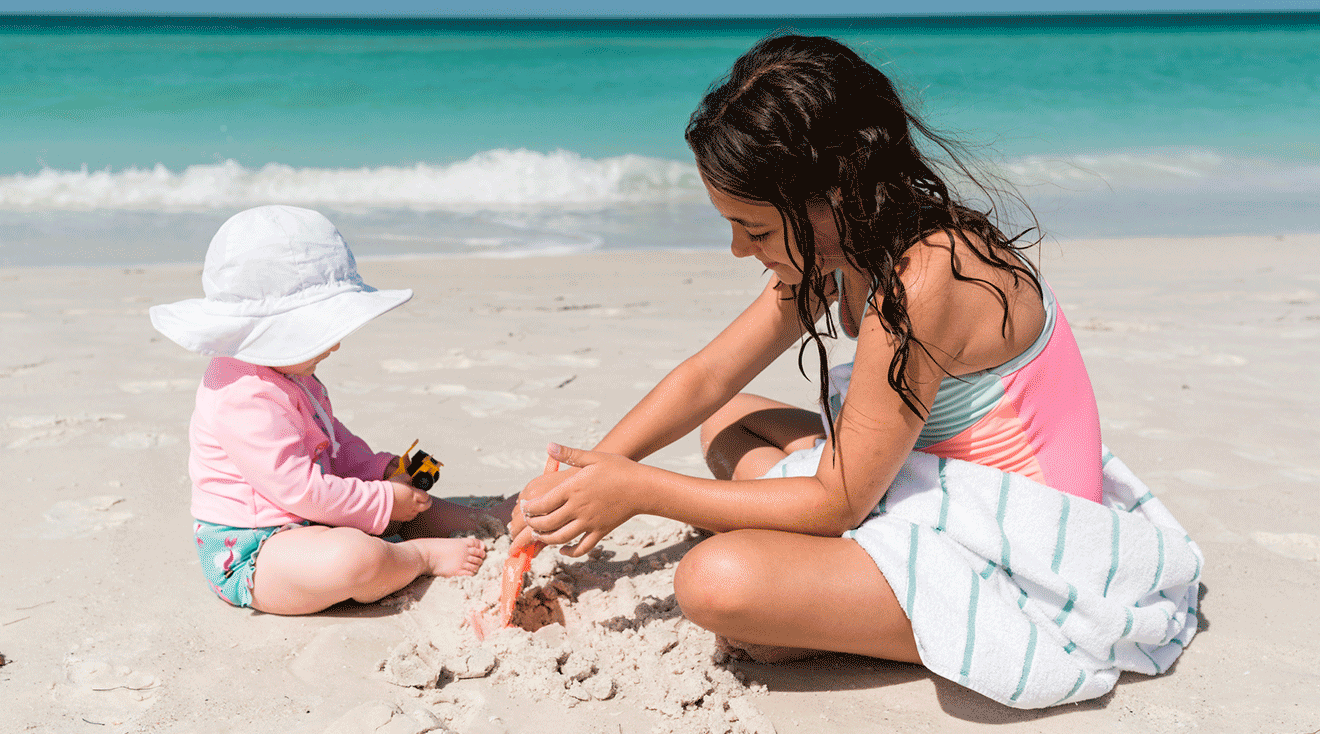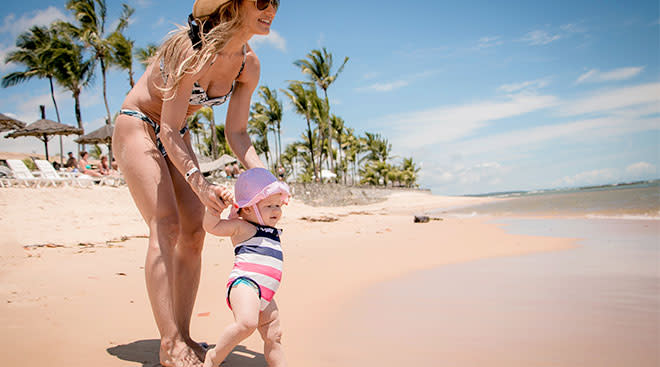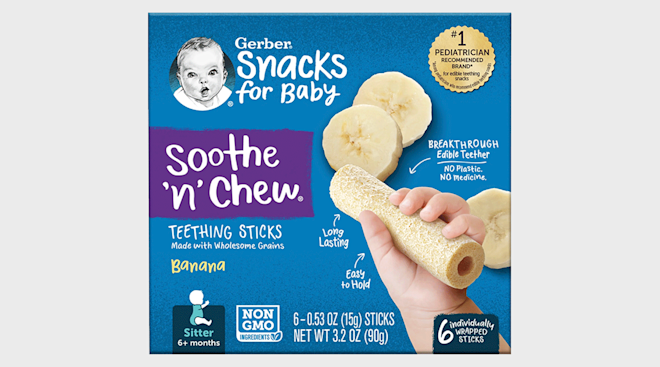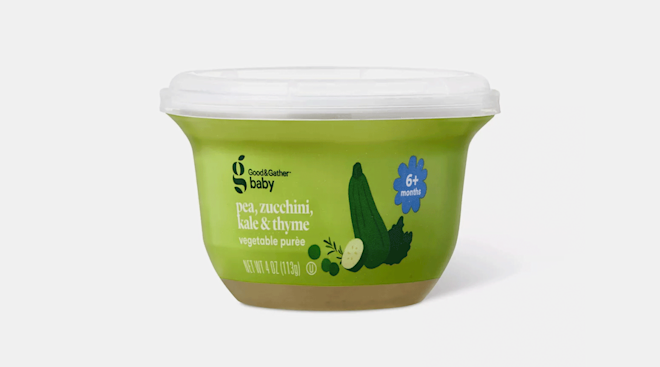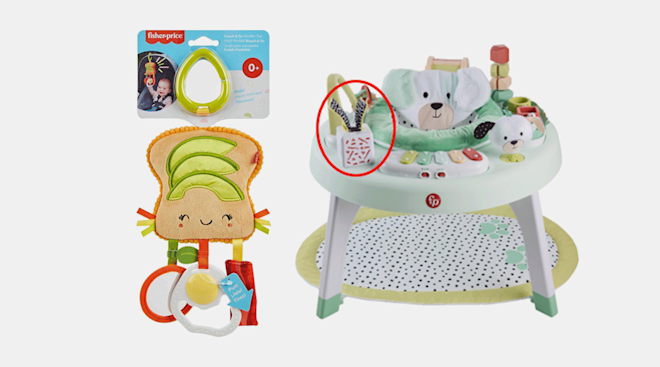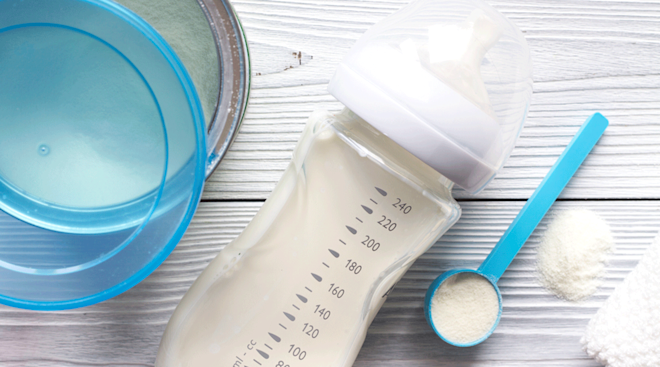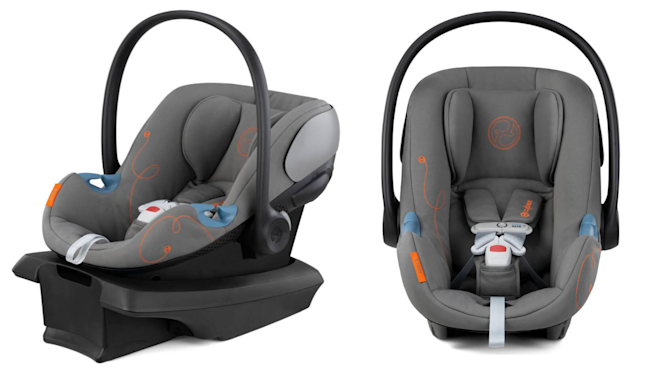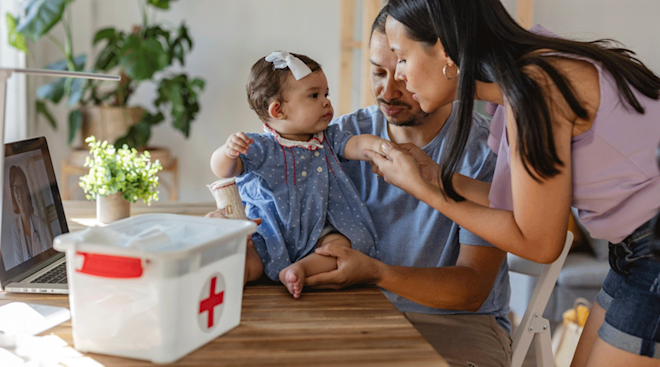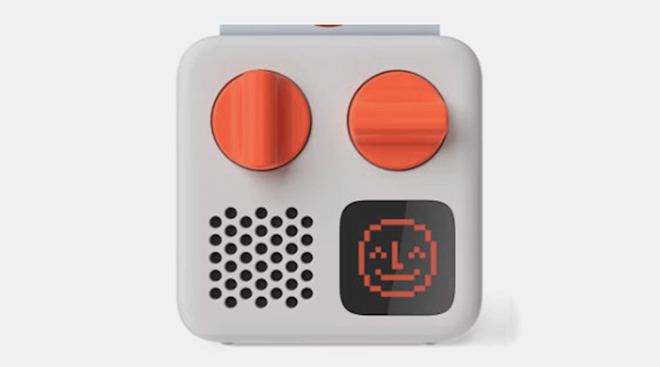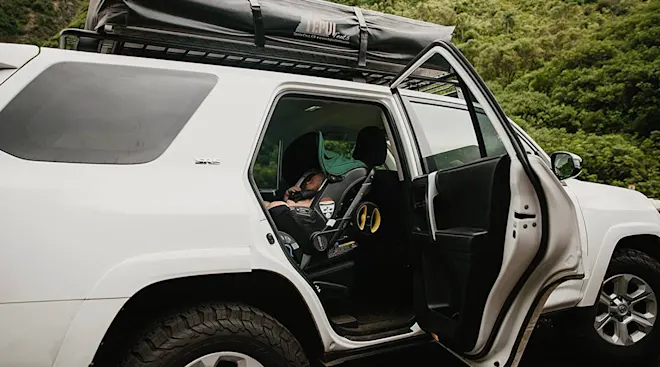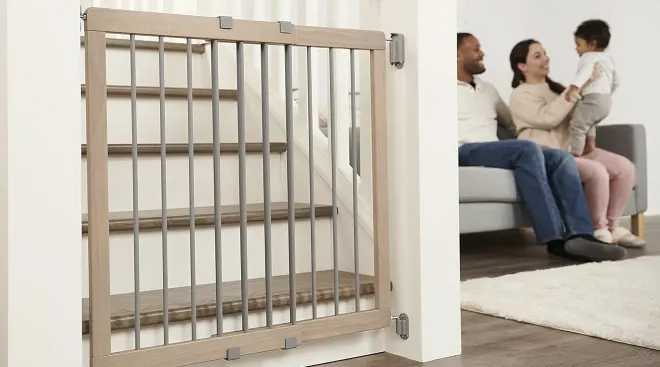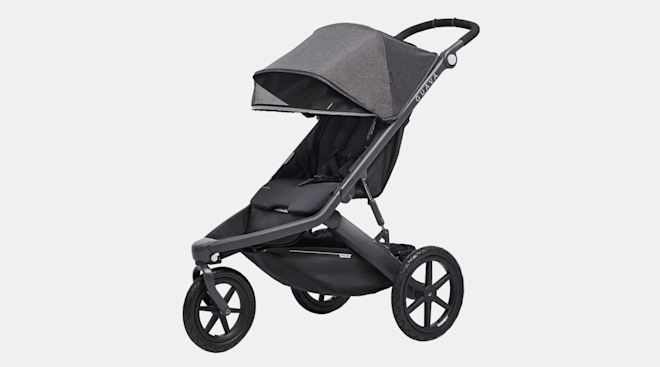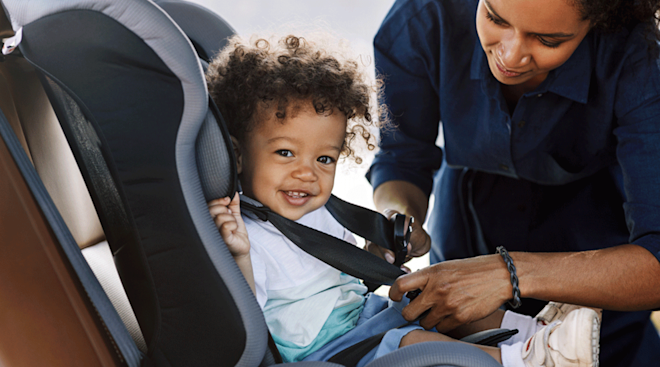How to Treat Sunburns on Babies, Toddlers and Big Kids
Having fun in the sun with the kiddos is something many parents look forward to. But, while being out soaking up the rays can break up a humdrum routine, there are some safety tips to keep in mind—particularly for younger children and babies. You already know sunscreen and sun protection is important—but it’s even more critical for newborns and infants. Luckily, there are several things you can do to keep your little one safe and lower the risk of a baby sunburn. Keep reading to learn from experts everything to know about baby sunburns, including how they happen, how to prevent them and some remedies for treating toddler and infant sunburns.
Whether you’re a baby, toddler, child or adult, too much sun exposure without adequate sun protection can result in a burn. However, babies and toddlers are more likely to get a serious sunburn—and far more quickly. “Their skin is not as developed or mature as ours, making them more susceptible to skin injury,” explains Ashanti Woods, MD, a pediatrician at Baltimore’s Mercy Medical Center. Moreover, they don’t have the same level of tolerance to sun exposure that older kids and adults do, adds Danelle Fisher, MD, FAAP, chair of pediatrics at Providence Saint John’s Health Center in California. “It’s very fresh, new skin,” Fisher says. “It can absorb the sun’s rays more significantly and get sunburned in a shorter period of time.”
Unfortunately, a toddler or infant sunburn can happen quickly. Woods says it can take as little as 15 minutes to 30 minutes of exposure. Of course, this will also depend on what time of day your baby is outside. The Environmental Protection Agency says UV exposure risk is at its highest from 10 a.m. to 4 p.m., making it more likely that baby will burn faster during this window of time.
Sunburns in babies will look similar to sunburns in older kids and adults. According to Joelle McConlogue, MD, a pediatrician with Stanford Medicine Children’s Health, infant sunburn symptoms generally include:
- Skin redness
- Skin that feels warm to touch
- Swelling
- Fussiness and crying
- Apparent pain when their skin is touched
- Blisters (for more serious burns)
According to Woods, a sunburn in infants and toddlers generally lasts between one and three days. Per Seattle Children’s Hospital, pain from sunburns can set in a few hours after exposure, peak around 24 hours later and start to heal 48 hours after exposure. That said, how long an infant or toddler sunburn lasts will depend on how old your child is, their built up tolerance to the sun, how long their exposure lasted, how strong the sun was during that time, what sun protection they had and how bad the burn is.
Toddler and infant sunburns can be considered emergencies under a few different circumstances. “With babies under 6 months old, we want to always be extra cautious and protective because their skin is so young, delicate and fragile—and because you can’t use sunscreen,” McConlogue says. Most pediatricians recommend avoiding sun exposure for babies under 6 months of age, but if you do need to venture out, speak to your pediatrician about using tiny amounts of sunscreen on small areas of the body, like the face.
It’s also important to note that baby and toddler sunburns can increase a child’s lifetime risk of developing melanoma, the most deadly form of skin cancer, says Gary Goldenberg, MD, assistant clinical professor of dermatology and pathology at the Icahn School of Medicine at Mount Sinai Hospital. “Sun damage is cumulative over a lifetime, so getting a sunburn in early childhood certainly does increase the risk of developing melanoma,” McConlogue explains. “Baby’s skin is really delicate and thin, so they’re much more susceptible to getting sunburned—and then they’re much more susceptible to that long-term damage.”
Heat-related illnesses
Heat-related illnesses—like heat rashes and sun poisoning in babies, toddlers and big kids—can happen when there’s prolonged and severe sun exposure. Again, the onset of these illnesses can depend on several factors, including the time of day, elevation, time spent in the sun, etc. “Anytime [you’re] out in the sun, you’re accumulating sun exposure. So there’s really no safe amount of time to be out in the sun without some protection, [especially] for babies,” McConlogue explains.
- Sun poisoning. Sun poisoning is an extreme sunburn caused by UV radiation, Fisher says. “Usually it’s after prolonged sun exposure without proper protection,” she adds. Children with sun poisoning will have red or inflamed skin, faster than normal breathing, lethargy and fussiness. Dehydration is also a big concern, Fisher says, adding that it’s crucial to try to give kids fluids when they’re struggling with sun poisoning.
- Heat rash. Heat rash is fairly common and can cause little pink dots to form on a child’s skin, Fisher says. It can also look like eczema, with dry, scaly patches, Goldenberg says. A heat rash usually shows up in a place where the child gets hot, like their neck, chest, and back. Removing layers of clothing can help a child cool down, and exposing their skin to air will help the rash go away.
You don’t necessarily need to call your child’s pediatrician for a simple sunburn, but you’ll want to check in with your pediatrician ASAP if you suspect your child is suffering from heat rash, sun poisoning or a severe sunburn. Along with the above symptoms, Woods and McConlogue also say to reach out if:
- Baby has a fever and is lethargic
- Baby’s vomiting
- Baby’s skin has blisters (usually indicates a severe sunburn)
- Baby has a sunburn on a large area of their body
- Baby has a bad sunburn on their face or if their face seems swollen
- Baby is really uncomfortable, unusually fussy or inconsolable
- Baby’s not eating or drinking much and getting dehydrated
The best way to help keep your little one safe from sunburn is to prevent it from happening in the first place, particularly for newborns and babies under 6 months. “The most important part of the whole thing is just prevention,” McConlogue says. “We don’t want to get to the point where the baby has a sunburn.” Below, experts offer some tips to keep your little one sunburn-free:
- Practice sun avoidance. If possible, keep your child out of the sun in the middle of the day when the sun is strongest. McConlogue recommends limiting outside time to earlier in the morning or later in the afternoon.
- Stay in the shade. Keeping your baby or toddler in the shade as much as possible is important for preventing a sunburn, especially if you need to go out during peak sun hours. “Make sure baby’s in the carrier and make sure there’s a cover over the carrier that blocks the sun,” McConlogue says. (Of course, you’ll also want to ensure baby doesn’t overheat.) Using an umbrella can also be helpful here. Keep in mind, though, it’s better to be in the shade than directly in the sun; babies can still get burnt in the shade if outside for too long.
- Use swim shirts and hats. Protective coverings that shield your child’s skin are crucial, Goldenberg says—and this is true even while in the shade. McConlogue suggests lightweight, UPF clothing that covers any of baby’s exposed skin, including legs and arms (even when it’s hot out). Plus, make sure baby has a hat that covers their scalp and shades their face and the back of their neck.
- Apply (and reapply) sunblock. It’s generally not recommended that babies under the age of 6 months use sunscreen, but there are exceptions—again, check in with your pediatrician. If your child is older than that, Woods recommends applying sunscreen 15 minutes before you go outside and reapplying every 90 minutes, as well as after your child plays in the water.
While you want to do everything to keep your child safe from the sun, sometimes sunburns inevitably happen. Wondering what to put on a baby sunburn? Below, experts outline a few steps you can take to help the sunburn heal and make your little one feel a bit more comfortable:
- Use a cool compress. If baby feels warm to the touch, a lukewarm bath can help. Or, grab a soft washcloth, wet it with cool water, wring it out and gently apply it to the burned areas to help soothe baby’s skin, Woods suggests. It’s important to note this should be cool and not cold, McConlogue emphasizes.
- Slather on baby-safe aloe vera. “Aloe vera is a good thing to put on a baby’s skin,” Fisher says. Just make sure you avoid options with a topical anesthetic like benzocaine or lidocaine—this can be toxic to babies, she adds.
- Moisturize regularly. In addition to using aloe, a gentle and hypoallergenic cream like Cetaphil is important to keep your baby’s skin moisturized, Fisher says. Avoid using petroleum jelly like Vaseline, Woods says—it traps in heat and can block pores so sweat can’t escape, increasing your child’s risk of infection.
- Use a topical antibiotic cream. In some cases, your child might benefit from a topical antibiotic cream like Polysporin or Bacitracin, Woods says. Of course, check with your pediatrician before using.
- Offer over-the-counter pain relief. McConlogue says baby-safe Tylenol can help if they seem uncomfortable. (But, again, check with your pediatrician first.)
- Make sure they stay hydrated. “Make sure baby takes extra fluids, drinks a little bit more and stays hydrated,” McConlogue says. Per UCLA Health, this helps the healing process, as your body sends the extra fluids to sunburned areas.
Frequently Asked Questions
How long does it take for baby’s skin to burn in the sun?
According to McConlogue, how long it’ll take for a toddler or baby to burn in the sun can vary depending on a few factors, including the time of day and how strong the sun is. “I think at 12 p.m. in a really strong sun, a baby can get sunburned in even 10 to 15 minutes,” she says, adding, “I don't think there's any amount of time that’s safe without using sun protection for being out in the sun.”
Can applying breast milk soothe baby’s sunburn?
While there may be plenty of anecdotal evidence for breast milk soothing baby’s sunburn, McConlogue says there isn’t medical evidence to show it makes a difference. “It's not going to hurt, but I don't know that it's going to help,” she says.
Can babies still get sunburned in the shade?
While the shade offers more protection than being in the direct sun, babies can still get sunburnt in the shade. “If the parents are going to be outside, I urge them to seek shade and to make sure that baby's in shade,” McConlogue says, adding, “They also need to use some protection because you can get a sunburn even in shade.”
What is the best type of sunscreen to use on babies?
Once baby is 6 months old, it’s safe to use sunscreen. According to the American Academy of Pediatrics (AAP), you should look for sunscreens that are broad-spectrum (meaning they screen both UVA and UVB rays), have an SPF of between 15 and 50 and include zinc oxide or titanium dioxide as active ingredients (avoid options with oxybenzone when possible).
Sun protection is important at any age, but especially for babies, as their skin is still maturing during those first couple of years of life. “A little bit of prevention goes a long way, both in terms of the acute consequences of sunburn, but also the long-term consequences…like cancer and melanoma,” McConlogue says. The good news? The earlier you build the habit of putting on sun protection, the better off your kids will be—even as adults. “You just start at a young age and kids get very used to it,” McConlogue adds. “As they go about their long life, they just say, ‘This is it, we’re doing sunscreen’ because you start with those habits really early.”
Please note: The Bump and the materials and information it contains are not intended to, and do not constitute, medical or other health advice or diagnosis and should not be used as such. You should always consult with a qualified physician or health professional about your specific circumstances.
Plus, more from The Bump:
Danelle Fisher, MD, FAAP, is the chair of pediatrics at Providence St. John’s Health Center in California. She earned her medical degree from Albert Einstein College of Medicine of Yeshiva University in New York City and completed her residency training at Children's Hospital Los Angeles in California.
Gary Goldenberg, MD, is an assistant clinical professor of dermatology and pathology at the Icahn School of Medicine at Mount Sinai Hospital. He received his medical degree from Temple University School of Medicine and completed his residency at Wake Forest University School of Medicine.
Joelle McConlogue, MD, is a pediatrician with Stanford Medicine Children’s Health and has over 20 years of experience She earned her degree from Columbia University College of Physicians and Surgeons and completed her residency at Children's Hospital of Philadelphia.
Ashanti Woods, MD, FAAP, is an attending pediatrician at Mercy Medical Center in Baltimore, Maryland. He earned his medical degree from Howard University College of Medicine in Washington DC and completed his residency at the University of Maryland Hospital for Children in Baltimore, Maryland.
US Environmental Protection Agency, UV Index Scale, February 2024
Seattle Children’s Hospital, Sunburn, October 2023
UCLA Health, The best ways to treat a sunburn, June 2021
Learn how we ensure the accuracy of our content through our editorial and medical review process.
Navigate forward to interact with the calendar and select a date. Press the question mark key to get the keyboard shortcuts for changing dates.

































